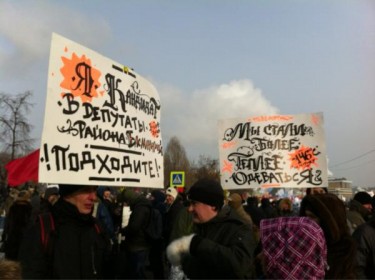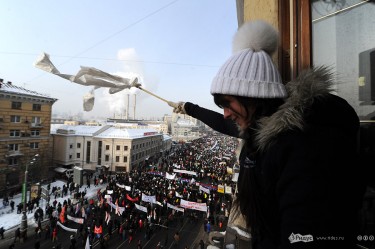This post is part of our special coverage Russia Elections 2011/12.
Despite temperatures of -20 degrees, thousands of Russians went out to the streets to participate in election demonstrations. Many, organised online, were protesting against the current election procedures and possible re-election of Prime Minister Vladimir Putin. Others, partly organised by pressure and bribes as well as fear of possible revolutions manifested that Putin should stay.
Bolotnaya vs Poklonnaya
Numerous demonstrations took place in nearly all big Russian cities. Most of them were of protest-oriented. Ridus.ru compiled a list of photo reports from different cities all around the country: Barnaul, Saint-Petersburg (1), Omsk, Yekaterinburg, Moscow (1, 2, 3), Kemerovo, Ivanovo, Perm, Tambov, Irkutsk, Chelyabinsk.
In Moscow, an anti-Putin demonstration started as a march and ended up at Bolotnaya square. A pro-Putin demonstration took place at Poklonnaya gora.

"We started to better warm up" poster at Bolotnaya Square, Moscow. Photo by Alexey Sidorenko
Symbols of the protesters included white ribbons, self-made posters and white balloons. In Moscow, white balloons were released at the end of the demonstration as popular musician Yuri Shevchyuk performed the song “Motherland” (see the recording of the performance here [ru]).
Many protest posters were inspired by Internet memes or quotes of Putin or his allies that circulated online due to their hypocrisy, bad grammar, or plain absurdity. Most of them were handmade with a high level of creativity, a distinctive contrast to the Soviet-style posters supporting Putin at the Poklonnaya event (see coverage [ru]).
The pro-Putin event in Moscow included some sincere supporters of Putin and his version of stability. At the same time, several cases of mass bribery and coercion were reported (1, 2). A few of my friends said that employees of public budget organisations were given a choice: either be fired or go to the event and receive a small award (depending on the source price varied from 500 to 1,000 rubles).
YouTube user Bandarlog20120204 uploaded a video shot at Kutuzovskiy prospect (next to Poklonnaya gora), where a lady distributed money to other people. When she realised she was being recorded, the lady tried to escape, thus provoking anger among those who did not manage to receive the ‘compensation’ for participation.
A hard dialogue among protest groups
Pro-Putin events mostly consisted of deliberately apolitical crowds (mostly labour unions, or the Soviet-era GoNGOs). On the other hand, protest events almost in every city consisted of at least four main groups: the general public, leftists (social-democrats and communists), nationalists, and liberals. This ‘coalition of negative consensus,’ however, did not work well everywhere.
The video below shows particular difficulties in finding a common ground among liberals and nationalists in Saint-Petersburg. An LGBT-activist who was given the floor was booed. After he finished, a nationalist activist came and started a speech that there should be ‘no [homosexuals] on the Russian soil.’ Then, he himself was severely booed by all other participants and was forced to leave the stage and was called ‘a Nazi’ and ‘a fascist.’
The missing network
After the demonstration was over, the Levada center published [ru] an interview with Boris Dubin, a renowned Russian sociologist, who described in detail the difference of “For Fair Elections” (FFF) movement compared to the previous protest movements:
Лет пятнадцать, наверное, как ничего похожего по скорости сплочения людей не было. Мы давно понимали, что есть 15-20, а по некоторым вопросам и 25 процентов взрослого населения, которые этот режим не принимают. Но это люди разрозненные, у них нет общих символов, нет общих лидеров. Не было понятно, как это меньшинство могло себя проявить. И вот оказалось, что в декабре, как, кстати, уже случалось в других странах в 2000-е годы, все завертелось вокруг проблемы «честных выборов», и дальше процесс пошел очень быстро.
He pointed out 3 main elements of unrest: 1. it is a principal protest against contemporary socio-political regime, 2. the sense that the real election results were different, 3. the failure of the government to accept citizens as partners. He also noted an unusually high level of connectedness among the protesters:
Пришли люди, внутренне связанные, которые реально или хотя бы воображаемо солидарны друг с другом, и им интересно и важно быть вместе. А для большинства российского населения это абсолютно нехарактерно. Все-таки в основном население раздроблено, размазано, людей соединяет только телевизор и убеждение, что, какая бы плохая власть ни была, надеяться можно только на нее. Власть у нас плохонькая, но наша, примерно так большинство населения думает.
According to Dubin's research, while 15 per cent of Russians would definitely participate in the protest actions, 44 approve such actions, and 40 per cent of the population condemns them. Dubin also discussed the role of the Internet in the protest actions: 60 per cent of the attendees of December 24 protest event (so called Sakharov demonstration) found out about the event online. 30 per cent found out about the event via their more connected colleagues. As Russian society lacks most conventional social networks (like church organizations, labour unions, etc) most people believe only their closest friends and families.
Although Dubin doesn't speak about the role of the Internet directly, it seems logical to suppose that in the absence of conventional networks, it is the Internet that has become the missing network that united so many uncoordinated ‘angry citizens.’
A Twitter parody account @igor_sechin ironically concluded [ru]:
Страна разделилась. Одна половина – за честные выборы, другая – за честные выборы Путина.
This post is part of our special coverage Russia Elections 2011/12.









8 comments
The turnout in Piter was woefully small, and outside Moscow the protests were dominated by Communist activists. The photo from Perm of a sea of KPRF flags is really quite terrifying, makes one wonder if Navalny has created a Frankenstein. http://www.ridus.ru/news/20736/